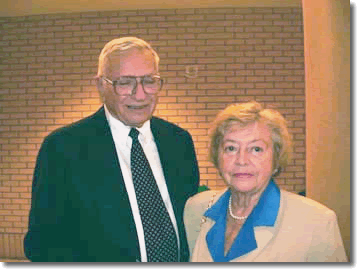 Paul A. Unger first arrived in Zagreb for a Christmas party one wintry December night in 1945, en route from his post as Commandant of a United Nations refugee camp for Croatians in Egypt to his new assignment in Split as Administrator for the United Nations relief program in Yugoslavia. That evening, he met Sonja Franz, a Croatian architect-engineer who became his wife by the next holiday season. Soon after they married, the Ungers left Croatia for the United States, where Mr. Unger was appointed Deputy Assistant Secretary of the US Department of the Interior. In 1953, Mr. Unger joined The Unger Company, a national food packaging developer in Cleveland, OH, as President/CEO.
Paul A. Unger first arrived in Zagreb for a Christmas party one wintry December night in 1945, en route from his post as Commandant of a United Nations refugee camp for Croatians in Egypt to his new assignment in Split as Administrator for the United Nations relief program in Yugoslavia. That evening, he met Sonja Franz, a Croatian architect-engineer who became his wife by the next holiday season. Soon after they married, the Ungers left Croatia for the United States, where Mr. Unger was appointed Deputy Assistant Secretary of the US Department of the Interior. In 1953, Mr. Unger joined The Unger Company, a national food packaging developer in Cleveland, OH, as President/CEO.
Many years passed as the Ungers raised a family and achieved prominence through volunteer service and community activism. All the while, the Ungers kept close contact with family, friends and colleagues that had remained overseas and yearned for a free, democratic Croatia. High hopes generated by the 1990 declaration of independence from Yugoslavia were quickly dashed by brutal civil war. Within a few years, however, the Ungers and their Croatian contacts perceived a window of opportunity as peace was restored.
In 1997, the Ungers assembled an advisory group of 45 American and Croatian banking, education and government leaders to found The Unger Croatia Institute for Public Administration as a means through which to build the capacity of reform-minded leaders to effectively facilitate Croatia’s transition from the devastating war to a more efficient, democratic government.
As a first step, Mr. Unger conceived of a fellowship program designed to assist senior Croatian officials progress toward improved practices in government, to be administered by his alma mater, Harvard University. He approached Dean Joseph Nye, of the John F. Kennedy School of Government, and the Unger Croatia Program was created. The Institute’s advisory group was charged with nominating and selecting candidates for participation. Between 1998-2001, the Ungers personally sponsored 22 Fellows at the Kennedy School, including Deputy Prime Ministers, Cabinet Ministers and Deputies, National Bank Governors, Parliamentary Committee Chairs, Ambassadors, and a Presidential candidate.
To build a program that could provide similar educational and professional development for local elected officials, Mr. Unger turned to the Maxine Goodman Levin School of Urban Affairs at Cleveland State University (CSU), which is ranked second in the nation for its programming. There, he enlisted the support of Director Thomas Cozzens and Dean Mark Rosentraub for the creation of the Unger Croatia Center for Local Government Leadership within Levin College in 2001.
The success of the Cleveland seminars inspired Mr. Unger to catalyze an educational bridge between Levin College and the University of Rijeka, which was formalized in 2002 by CSU President Dr. Michael Schwartz and University of Rijeka Rector Dr. Daniel Rukavina. In the summer of 2004, the University of Rijeka hosted its first seminar for public officials in Croatia in collaboration with USAID and the Unger Center. In the fall of 2004, the University of Rijeka introduced its new program in Public Administration, an important step toward the eventual realization of the first-ever-in-Croatia Graduate School of Public Administration.
Mr. Unger continued to forge ahead in his tireless efforts to facilitate the fulfillment of an ever-broadening vision for a prosperous Croatia until his death in January 2009. Plans for transferring expanded educational technical assistance, supporting capacity-building efforts of Croatia-based nonprofit organizations dedicated to local government reform and developing a series of public administration publications are in progress. Meanwhile, government is being transformed. Program participants have returned home and implemented the approaches and techniques learned through case studies, lectures, practicum and shadowing exercises, creating an environment that promotes transparency and community partnership. In fact, the first public hearing in Croatia’s history was held in Crikvenica in 1999, where both the mayor and his deputy were Unger seminar graduates. Citizens in that city and across the nation have become increasingly involved in local government, taking an active role in setting budget priorities and guiding community development. Through his dedication, commitment and leadership, Mr. Unger has made a tremendous contribution to Croatia’s progress.

